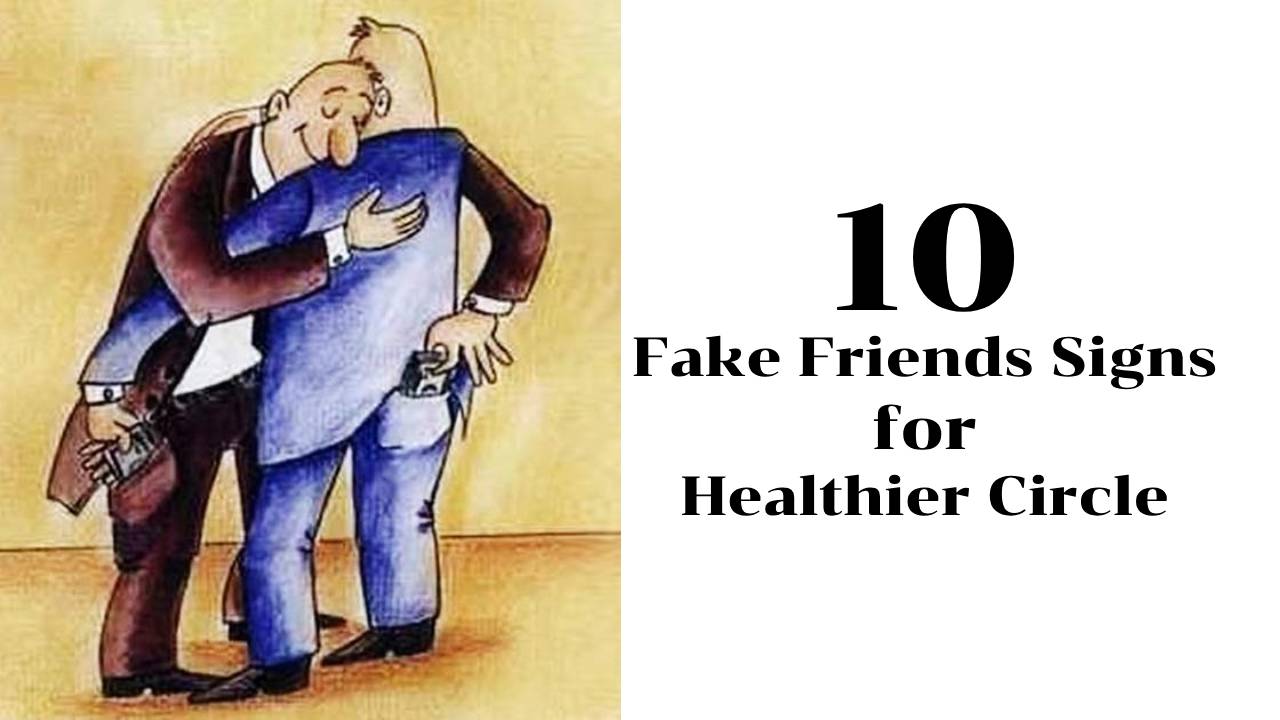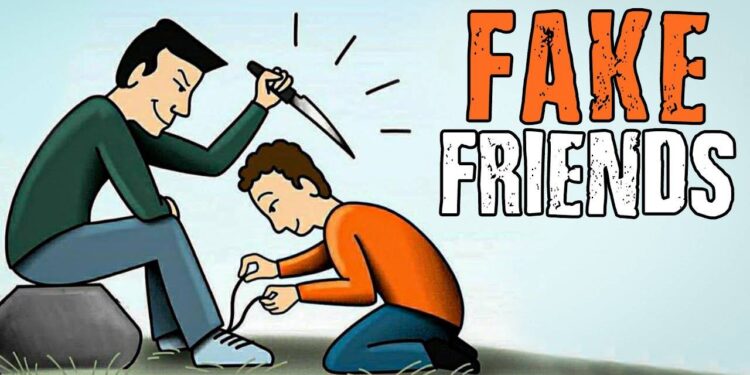Relationships weave the threads that shape our experiences and contribute to our emotional well-being into the intricate tapestry that is life.
Valid associations are the mainstays of help, giving comfort, bliss, and a feeling of having a place. Perceiving fake friends signs is significant for cultivating a better group of friends, underlining the significance of certified associations.
Genuine companionships act as a shelter, giving profound food and contributing decidedly to our general prosperity. On the other side, the invasion of phony companions into our lives can make significant impacts, presenting poisonousness, stress, and a feeling of treachery.
To help you find the fake friends signs and decode the subtle nuances of relationships, this blog post will lead you through the maze of relationships.
Understanding Fake Friends
A keen eye is required to navigate the complex landscape of social connections, particularly when it comes to distinguishing between genuine companionship and deceptive affiliations.
In this part, we dive into the basic part of understanding phony companions, revealing insight into their characterizing highlights and the vital significance of perceiving signs right off the bat in the relationship.
By unwinding the layers of trickery that frequently cover counterfeit kinships, we enable ourselves to build a social circle grounded in credibility and trust.
Definition and Characteristics
Counterfeit companions, frequently concealed in the pretense of genuine friendship, display particular qualities that put them aside from certifiable companions.
Not at all like credible connections, which flourish with shared regard and backing, counterfeit kinships are described by a shallow association. Although they may pretend to be loyal, these people lack the sincerity and emotional investment required for a meaningful relationship.
Identifiable characteristics encompass conditional support, inconsistency, and a penchant for gossip and betrayal—clear fake friends signs. Unraveling these nuances is crucial to distinguish the genuine from the counterfeit and nurturing relationships that positively contribute to our lives.
B. The Need for Recognizing Fake Friends Signs Early
The adage “forewarned is forearmed” holds particularly true in the realm of friendships. Recognizing the signs of fake friends early in the relationship is paramount for several reasons.
First and foremost, it allows individuals to protect their emotional well-being by preventing the toxic influence of insincere connections.
Fake friends signs recognizing early also offer an opportunity to reassess and potentially distance oneself from individuals who may impede personal growth and happiness. Early detection becomes a key to navigating healthier relationships.
Armed with the knowledge of these telltale fake friends signs, individuals can navigate their social circles with increased discernment, fostering relationships that stand the test of authenticity.
10 Telltale Signs of Fake Friends

It is essential to recognize the warning signs of fake friends in our social circles before embarking on the journey to deciphering the complexities of relationships. Recognizing these imperative fake friends signs for a healthier connection.
In this segment, we will fastidiously take apart ten indications that act as a compass, directing us through the labyrinth of tricky kinships.
To keep a healthy, genuine network of connections free of the toxicity that fake friends can bring, it is essential to comprehend these nuanced indicators.
Fair-Weather Friendship
One of the most glaring signs of a fake friend is their tendency to appear only in fair weather. At the point when times are great and achievement is very close to home, they rush to celebrate with you.
In any case, when the tempest mists assemble, and challenges emerge, these faint-hearted allies are missing. Certified companionships persevere through both the bright days and the tempests, offering unflinching help through various challenges.
Selective Support
True friends offer consistent support, irrespective of the situation. In contrast, fake friends showcase selective support, offering a helping hand only when it aligns with their interests or agenda.
Recognizing this pattern is crucial for maintaining emotional balance and understanding who stands by you genuinely.
Energy Vampires
Fake friends often manifest as energy vampires, leaving you drained and depleted after each interaction. Rather than elevating and empowering, they bring cynicism and show.
Distinguishing these energy-depleting connections is imperative for saving your prosperity and guaranteeing your close-to-home repository is loaded up with inspiration.
Conditional Companionship
Authentic friendships are unconditional, and rooted in mutual respect and care. In contrast, fake friends signs manifest in conditional companionship—being present only when it serves their interests and disappearing once their needs are met. Recognizing this conditionality is essential for fostering relationships grounded in authenticity.
Jealousy and Competition
Sound kinships are based on shared help and festivity of one another’s triumphs. However, fake friends frequently indulge in unhealthy competition and harbor jealousy. They might make light of your accomplishments or endeavor to surpass you, establishing a climate of cynicism and contention.
Flakiness
Dependability is a foundation of certified companionships. Counterfeit companions, be that as it may, display a steady example of flakiness — dropping plans, showing up later than expected, or being for the most part inconsistent. Perceiving this absence of responsibility is fundamental for keeping up with adjusted and conscious associations.
Superficial Conversations
Genuine friendships flourish through meaningful conversations, delving into emotions and experiences. Recognizing fake friends signs involves noting their tendency to keep interactions superficial, avoiding deeper discussions. Identifying this pattern helps differentiate between relationships that add depth to your life and those that remain superficial.
Lack of Reciprocity
Companionship is a proportional trade of care, time, and backing. On the off chance that you wind up reliably giving more than getting, it very well might be an indication of an uneven relationship. A reexamination of the dynamics of the friendship is made possible by recognizing this lack of reciprocity.
Tattle and Double-crossing
Trust is an underpinning of veritable kinships, and phony companions frequently sell out that trust through tattle and double-crossing. On the off chance that you notice a companion participating in a bad discussion about you or subverting your certainty, tending to these harmful behaviors is urgent.
Inconsistent Communication
Powerful openness is of the utmost importance for any sound relationship. Counterfeit companions, be that as it may, may display irregularity in their correspondence, possibly connecting when they need something or vanishing for expanded periods without clarification. Identifying this inconsistency is essential for maintaining clarity in your social connections.
The Impact of Fake Friends on Your Life
It is essential to highlight the significant impact that fake friends can have on a person’s life as we continue our investigation into the intricate dynamics of friendships. While certified associations act as wellsprings of happiness and backing, tricky connections can leave a path of profound destruction.
We examine the nuanced effects of fake friends in this section, highlighting the emotional toll, the loss of trust, and strategic self-preservation tips.
Understanding the gravity of these outcomes is vital to exploring the sensitive territory of kinships and shielding our psychological and profound prosperity.
Emotional Toll
Counterfeit companions take a weighty close-to-home cost, leaving people wrestling with sensations of selling out, dissatisfaction, and dejection.
The close-to-home venture made in these connections, combined with the acknowledgment of trickery, can prompt a significant feeling of harm.
Perceiving and recognizing the close-to-home cost is the most important move toward mending and recovering one’s harmony.
Trust Issues
The impact of fake friends extends beyond the immediate emotional distress, often resulting in the erosion of trust. Skepticism can be sown by betrayal and deception, making it difficult to trust others in subsequent relationships.
Constructing and keeping up with trust is a crucial part of solid associations, and the break brought about by counterfeit companions can raise questions about future kinships.
Strategies for Self-Preservation
In the repercussions of managing counterfeit companions, embracing procedures for self-safeguarding becomes fundamental.
Essential practices include developing self-awareness to identify toxic patterns, establishing boundaries to safeguard one’s emotional well-being, and learning to differentiate between genuine and fake friendships.
Moreover, encircling oneself with a steady organization of genuine companions builds up the significance of legitimate associations and helps during the time spent recuperating.
Building a Healthier Circle
In the outcome of exploring the complicated landscape of phony companions, the quest for a better group of friends turns into a basic excursion. Building significant associations that contribute decidedly to one’s life requires purposeful and conscious exertion.
This segment fills in as an aide, offering experiences into the means important to develop a vigorous and bona fide network. From evaluating current connections to encouraging certifiable associations and drawing shrewdness from previous encounters, the excursion toward a better circle includes self-reflection and purposeful activities.
How about we leave this extraordinary interaction to guarantee that the texture of our social associations is woven with strings of genuineness and common regard?
Assessing Current Relationships
The first step toward building a healthier social circle involves a critical assessment of existing relationships. Take stock of the dynamics, evaluating whether friendships are based on reciprocity, trust, and genuine support.
Identify any lingering signs of fake friends and, if necessary, make the difficult but liberating choice to distance oneself from toxic connections. This self-reflection establishes the groundwork for a more deliberate and satisfying interpersonal organization.
Fostering Genuine Connections
Encouraging real associations is the foundation of a better group of friends. Focus on higher expectations when in doubt, looking for connections based on shared values, trust, and common regard. Participate in open correspondence, effectively tuning in, and articulating your thoughts.
By cultivating a climate of trust and understanding, you make space for associations that endure everyday hardship and contribute emphatically to your general prosperity.
Learning from Past Experiences
The insight acquired from previous encounters, incorporating experiences with counterfeit companions, is a significant aid for molding future connections. Ponder the examples mastered, knowing examples, and warnings that might have been disregarded before.
Utilize these experiences to refine your judgment, improving the skill to recognize authentic kinships and those that might present likely mischief.
Each experience, whether positive or testing, adds to the development and versatility expected to organize a better circle.
Conclusion
In the complicated dance of human associations, the capacity to translate the nuances of connections is an expertise that engages people to cultivate a circle of positive and genuine companionships. By unwinding the signs of fake friends, we make ready for a satisfying and improving social experience.
As we close this investigation into perceiving fake friends signs, accentuating the significance of self-empowerment is fundamental. Outfitted with the information acquired, enable yourself to develop positive fellowships that stand the trial of legitimacy, faithfulness, and common regard.
The excursion to a better group of friends isn’t just a mission for veritable associations but also a continuous course of self-disclosure and development. You can create a social environment free of the fake friends signs that are beneficial to your well-being by actively evaluating relationships, encouraging authenticity, and learning from past experiences.
As you leave on this excursion, recollect that each move toward validness is a stage toward a better, really satisfying life encompassed by evident companions.
Share your considerations and encounters in the remarks underneath, and remember to spread this important data to your companions. Together, how about we fabricate circles that blossom with trust, support, and veritable brotherhood?















































